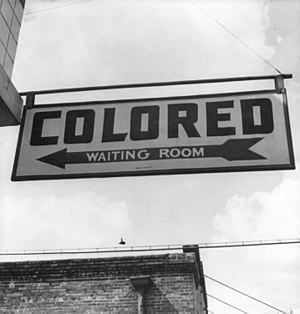Considering all the overblown rhetoric about how post-racial we’re supposed to be, I thought a short description of how post-racial we actually are, and how post-racial we could be, might be useful.
Our society is post-racial
We actually do live in a post-racial society, if by society we actually mean culture. The pervading culture is clearly as post-racial as it has ever been. The popular understanding across the ideological spectrum argues that we should not discriminate against minorities, that all people are of equal value to society, and that everyone should be given the opportunity to succeed. This is especially true when looking at the culture generationally, with each younger generation displaying an increasingly postmodern cultural mindset. The culture itself is growing increasingly post-racial.
Our society is still racist

Just as the pervading cultural identity is becoming increasingly post-racial, the small, localized cultural groupings are demonstrating an intractable sense of racism. As is the case of many social movements that generate distinct majorities of the population, counter-movements are spawned. Some counter-movements are destined to demonstrate some form of slight alteration of the status quo while accounting for the changes in the pervading culture. Think: Roman Catholicism’s Counter Reformation to the Great Reformation. Other localized cultural groupings refuse to allow themselves to be changed and double-down on their starting position. This means many groups that are perhaps marginally racist may become overtly racist out of fear of the new cultural norms. These groups represent a slim minority of people, but are often overrepresented in public and are given greater TV time by a media that preferences conflict.
Our society is racial
In the first component, we see the way the country sees itself as represented by the vast majority of people’s vision for the society. In the second, we see minority groupings of people who reject out-of-hand the movement of the wider culture to become something else. The third component is found in the society’s structures themselves. This represents the federal, state, and local governments, corporations, and non-profits that govern and make up the framework of our society. When we look at our structures we see that irregardless of our intentions, our society is deeply racial. This is particularly true for the work of all three branches of government, which has been much more focused over the last three decades on preserving the rights of racists to demonstrate racial animus rather than in encourage the racial tolerance necessary to live out a truly post-racial society.
It is clear to me that the key to transforming our racial culture is not found in interpreting laws as if we were already post-racial, but in actually striving to be such. For it doesn’t matter one bit if we act one way, but the criminal justice system hasn’t evolved past the 1960s. We must also stop criminalizing black culture and disproportionately condemning blacks to prison and execution. We must stop treating the drugs used by poor blacks differently than the ones used by rich whites. We must strengthen our urban schools and provide more services that make up for underemployment. We must give our city kids the same chances as our suburban kids.
Race doesn’t change unless we change the way we legislate race.
What are your thoughts?
Leave a Reply